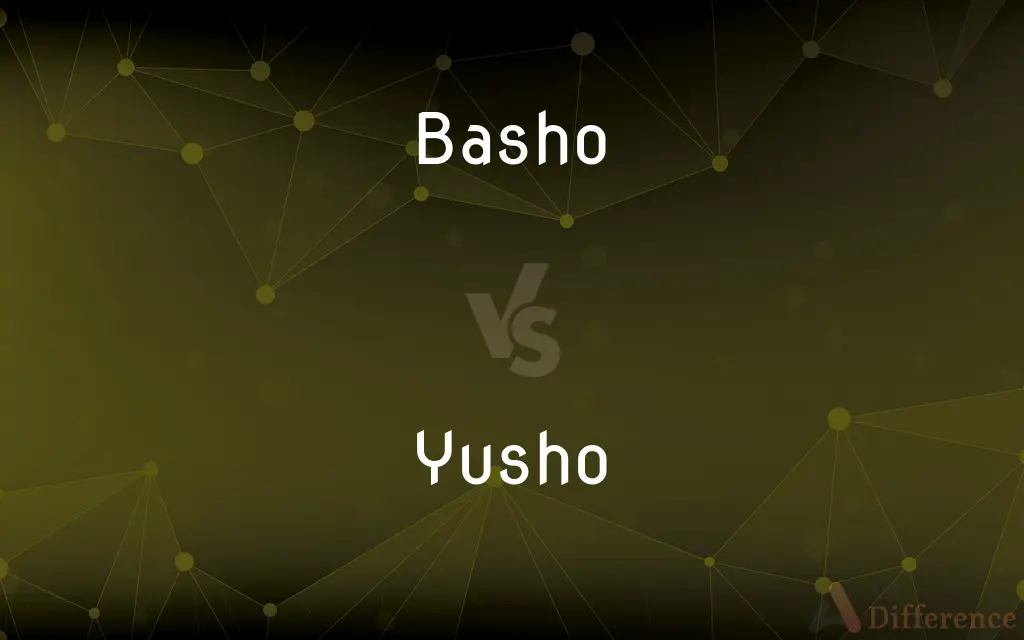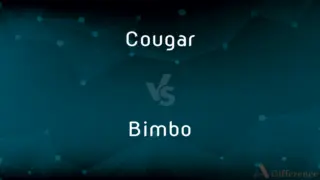Basho vs. Yusho — What's the Difference?
By Maham Liaqat & Fiza Rafique — Updated on April 9, 2024
Basho refers to a sumo wrestling tournament in Japan, while Yusho signifies a championship victory in such tournaments.

Difference Between Basho and Yusho
Table of Contents
ADVERTISEMENT
Key Differences
Basho are official sumo wrestling tournaments held six times a year in Japan, integral to the sumo wrestling culture and rankings. These tournaments last for 15 days, where wrestlers compete in one match per day, aiming for the best record. On the other hand, Yusho refers to the championship title awarded at the end of a basho to the wrestler with the most wins. Achieving a yusho is a significant accomplishment, often influencing a wrestler's rank and status within the sumo community.
While basho provides a structured, time-bound platform for competition, showcasing the skills, strength, and strategy of sumo wrestlers, yusho is the ultimate goal for participants, symbolizing triumph and prestige. The excitement of a basho not only lies in the individual matches but also in the overarching quest for the yusho, with fans and wrestlers alike closely watching the win-loss records as the tournament progresses.
Basho are categorized into different divisions, with the top division known as Makuuchi, where the most skilled and high-ranked wrestlers compete. In contrast, yusho can be won in any division, but its value and recognition are significantly higher in the top divisions, especially in Makuuchi.
The performance in a basho directly impacts a wrestler’s chance of winning a yusho, with strategies and endurance being tested throughout the 15-day period. While every wrestler enters a basho with the aim of winning, securing a yusho requires not just skill but also consistency and mental fortitude over the course of the tournament.
Basho and yusho are deeply interconnected, with the former serving as the battlefield and the latter as the ultimate prize. While all wrestlers participate in basho with the hope of victory, only one can emerge as the yusho winner, etching their name in sumo history.
ADVERTISEMENT
Comparison Chart
Definition
An official sumo wrestling tournament held six times a year in Japan.
The championship title awarded at the end of a basho.
Duration
15 days, with wrestlers competing in one match per day.
Awarded at the end of the basho, not a separate event.
Significance
Provides a platform for competition and influences rankings.
Symbolizes triumph, influencing a wrestler’s rank and prestige.
Division Impact
Competitions occur across various divisions, including Makuuchi as the top division.
Can be won in any division, but most prestigious in the top division.
Goal
Wrestlers aim for the best record over 15 days.
Achieving the most wins in a basho to secure the championship.
Compare with Definitions
Basho
Integral to sumo culture.
Basho throughout the year decide the annual rankings of sumo wrestlers.
Yusho
A sumo championship title.
Winning a yusho is the highest honor for a sumo wrestler.
Basho
An official sumo tournament.
The July basho is held in Nagoya, attracting sumo fans from all over the country.
Yusho
Awarded for most wins in a basho.
He secured his first yusho with a record of 14-1.
Basho
A 15-day wrestling competition.
He prepared rigorously for the upcoming basho to improve his rankings.
Yusho
Symbolizes prestige and victory.
His yusho victory brought great pride to his stable.
Basho
Occurs six times a year.
Each basho offers wrestlers a chance to ascend in rank.
Yusho
Influences rankings and status.
A yusho win can significantly boost a wrestler’s career.
Basho
Influences wrestler rankings.
His exceptional performance in the last basho moved him up several ranks.
Yusho
The goal of every sumo wrestler.
Dreaming of a yusho, he trains tirelessly every day.
Basho
(sumo) a sumo tournament of any kind
Yusho
(sumo) The top-ranking position at the end of a basho; the championship.
Common Curiosities
How long does a Basho last?
A basho lasts for 15 days, with wrestlers competing in one match each day.
What is a Basho?
A basho is an official sumo wrestling tournament held in Japan, occurring six times a year.
What does winning a Yusho mean?
Winning a yusho means securing the championship title at the end of a sumo tournament, symbolizing the highest honor in a basho.
Can a wrestler win a Yusho in any division?
Yes, a wrestler can win a yusho in any division, but it is most prestigious in the top division.
How does a wrestler prepare for a Basho?
Wrestlers prepare through rigorous training, focusing on strength, technique, and endurance.
What happens if there's a tie for a Yusho?
In the event of a tie, a playoff match determines the yusho winner.
What is the significance of a Basho in sumo wrestling?
Basho are crucial for competition, ranking, and the cultural tradition of sumo wrestling in Japan.
How does winning a Yusho affect a wrestler's career?
Winning a yusho can significantly boost a wrestler's rank, prestige, and career prospects.
Are Basho held in the same location?
Basho are held in various locations across Japan, including Tokyo, Osaka, Nagoya, and Fukuoka.
Can foreign wrestlers win a Yusho?
Yes, foreign wrestlers can and have won yusho, contributing to the international appeal of sumo wrestling.
How is a Yusho awarded?
A yusho is awarded to the wrestler with the most wins at the end of a basho.
What are the ranks in sumo wrestling?
Sumo wrestling ranks range from lower divisions up to the top Makuuchi division.
What's the difference between a Basho and a regular sumo match?
A basho is an official tournament comprising multiple matches over 15 days, unlike single sumo matches.
What does a Yusho victory entail besides the title?
Besides prestige, a yusho victory often includes trophies, prize money, and increased recognition.
How important is strategy in winning a Basho or Yusho?
Strategy is crucial in both winning individual matches and securing a yusho, requiring physical and mental preparation.
Share Your Discovery

Previous Comparison
Cougar vs. Bimbo
Next Comparison
Ha vs. AhAuthor Spotlight
Written by
Maham LiaqatCo-written by
Fiza RafiqueFiza Rafique is a skilled content writer at AskDifference.com, where she meticulously refines and enhances written pieces. Drawing from her vast editorial expertise, Fiza ensures clarity, accuracy, and precision in every article. Passionate about language, she continually seeks to elevate the quality of content for readers worldwide.
















































